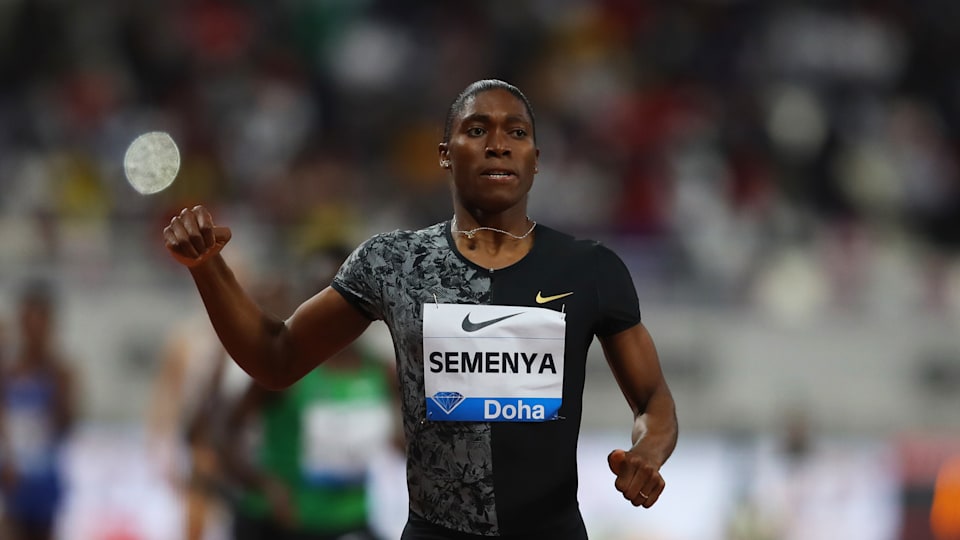Caster Semenya cleared to run 800m at Prefontaine Classic
Swiss Supreme Court extends suspension of IAAF Hyperandrogenism Regulations by six days, allowing double Olympic champion to contest 800m on Sunday.

Caster Semenya has been cleared to run the 800m at the Prefontaine Classic on Sunday (30th June).
The double Olympic champion made the switch from the 3,000m to her favourite distance earlier this month after the Swiss Supreme Court ruled that the IAAF must temporarily suspend its hyperandrogenism regulations.
That suspension was due to expire on Tuesday (25th June), but the Swiss Supreme Court has retroactively extended it until 1st July allowing her to run at the Diamond League meeting.
Tuesday also saw the IAAF submit its response to the Swiss court's decision to allow Semenya to run while her appeal is being considered.
The story so far
Seneya was originally entered in the 3,000m after the Court of Arbitration for Sport (CAS) rejected her appeal against the IAAF Hyperandrogenism Regulations on 1st May.
But the Swiss Supreme Court ruled on 3rd June that the IAAF must suspend those regulations - which force female runners at distances between 400m and one mile with certain Differences of Sexual Development (DSD) to lower their testosterone levels - immediately with regard to Semenya.
"Caster’s representation requested that she be removed from the 3,000 metres to the 800 metres and we are happy to comply. Indications are she will be going for a fast time." - Prefontaine Classic director Tom Jordan speaking to Reuters
An IAAF spokesperson told Reuters, "Nothing changes from our point of view. It should be noted that the Diamond League meetings are not organised by the IAAF."
The Diamond League meeting is being held this year in Stanford, California while its usual Eugene home, Hayward Field, is being rebuilt ahead of hosting the 2021 World Championships.
Back to her best event
Semenya last ran her favourite distance of 800m at the Doha Diamond League on 3rd May, extending her unbeaten record in the event to 30 races since 2015.
The 28-year-old had made a late entry after CAS had ruled in favour of the IAAF, meaning she would have to start taking medication to reduce her testosterone-blood concentration to 5nmol/L from 11th May in order to defend her world title in October.
But Semenya took the case to the Swiss Supreme Court who, as well as suspending the ruling, gave the IAAF until 25th June to respond.
The South African star had wanted to run the 800m at the Rabat Diamond League on 16th June, but the Royal Moroccan Athletics Federation barred her from taking part before reversing that decision too late for her to take part.
Semenya won the 2,000m on 11th June at the Meeting de Montreuil near Paris, afterwards saying she could run any distance if she was unable to continue at 800m.
"Human guinea pig"
Earlier this month, Semenya again expressed her vehement opposition to taking medication having been forced to do so from 2010 to 2015 after her DSD was found following her victory at the 2009 World Championships.
Her outburst came after CAS released its full 163-page judgment explaining why it found against her in May.
Among the revelations in the report were that the IAAF advanced the position that women like Semenya who have an XY chromosome pair were "biological males".
Semenya said, "The IAAF used me in the past as a human guinea pig to experiment with how the medication they required me to take would affect my testosterone levels.
"Even though the hormonal drugs made me feel constantly sick, the IAAF now wants to enforce even stricter thresholds with unknown health consequences.
"I will not allow the IAAF to use me and my body again. But I am concerned that other female athletes will feel compelled to let the IAAF drug them and test the effectiveness and negative health effects of different hormonal drugs. This cannot be allowed to happen."
The IAAF welcomed the full release of the report, saying, "The IAAF considers that the DSD regulations are a necessary, reasonable and proportionate means of protecting fair and meaningful competition in elite female athletics, and CAS agreed."
